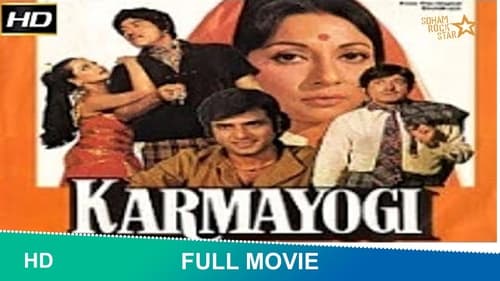
Screenplay
Brash, outspoken, and aethiest Shanker lives in a small village with his son, Mohan, and his devout wife, Durga, who is expecting another child soon. One day Shanker decides to leave and takes Mohan with him, leaving a pregnant Durga alone. Years go by, both Mohan and Ajay have grown up. Mohan and Shanker operate a crime syndicate, partnering with Keshavlal, a notorious gangster. Ajay operates a publicatin called Karmayogi, in which he publishes news and information about crime and criminals, and does an expose on Keshavlal. Mohan and Shanker want a bigger stake in the share, which Keshav agrees to, but arranges for Shanker to get killed, and blames it on Ajay. When Shanker is killed, Mohan swears to avenge his father's death and begins the trek of locating and killing Ajay.

Screenplay

Screenplay

Dialogue

Writer
When a village girl is rejected by a modern suitor, a zamindar named Nikhilesh comes to her rescue and transforms her. However, with time, the two end up falling in love with each other. Will they be able to unite against their original plan?

Screenplay
The plot revolves with Raicharan's tragic life. He is the obedient servant of local zamindar and takes care of zamindar's son whom he addresses as Khokababu. One day the little son dies in an accident in river flood and he is blamed for the same. In a delusional state, Raicharan starts believing his own infant to be his much loved khokababu and brought him up only to return him to his master.

Screenplay
Raikamal narrates the story of Rai Kamal, a devotee of Lord Krishna. Rai Kamal and Ranjan are childhood sweethearts. When Ranjan grows up he wishes his desire to marry Rai but his parents are against this match as they are Brahmins and Rai Kamal was a low caste Vaishnav.

Director

Director

Screenplay
One of the early films of Chhabi Biswas featuring him as a leading man, before he came to be associated with the dominating patriarch roles that have become iconic in Bengali cinema, the film is a tale of the love, relationships and ideals of two generations. Nutubihari is an idealist who has given up his love for Kalyani for the sake of his beliefs. He marries Bimala and becomes a lawyer, fighting for the rights of the poor against the feudal lords. Meanwhile, Kalyani comes to ask refuge after she becomes a widow and is inexplicably accepted by Bimala with a lot of warmth. As the years pass Kalyani's daughter Mamata and Nutu's oldest son Arun fall in love and wish to get married. However, the new-found fame and fortune turns his head and Nutu begins to resemble all the ideals and vices that he had always despised. On the other hand in an ironical turn of events, Arun comes to occupy the position once held by his father, highlighting the generational conflict of ideals.

Dialogue
A famous radio singer Mohan (Saigal) is in love with Geeta (Leela Desai). When he goes to his friend a doctor, TB Specialist, Bijoy (Bhanu) for a check-up, he is found to be in an advance stage of TB. Meanwhile Leela's dominant mother and aunt (Nibhanani and Manorama) had been against the poor Mohan and had set their eyes on same Dr. Bijoy, the son of a family friend. When Mohan comes to know of it, and also his sickness, he decides to walk away from them. He is intercepted by a doctor who ran a sanatorium for TB patients, with some new method of treatment. Geeta couldn't forget Mohan and waited, but in the end she had to relent. Then it was known that Mohan was alive and cured. What would now Bijoy and Geeta do? There wedding was the next day, and they have to go ahead with it, the honour of both the families were at stake. Mohan too aware of his being exposed, disappears from the sanatorium and is untraceable.





